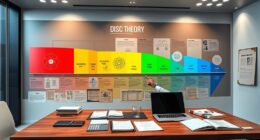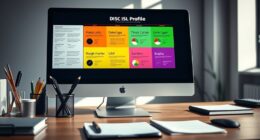Releasing your potential in an interview often comes down to how you handle the final question. Use this moment to showcase your unique strengths and make a lasting impression. Prepare by reviewing your resume and aligning your experiences with the company's mission. Be enthusiastic and practice your responses for clarity. Storytelling is powerful—share relevant anecdotes that highlight your skills and how you've overcome challenges. Don't forget to engage with confidence and offer a follow-up question. This approach not only emphasizes your qualifications but also demonstrates your genuine interest in the role. Discover more ways to impress further as you continue.
Key Takeaways
- Reflect on your key accomplishments and experiences to effectively summarize your strengths during the final question.
- Research the company's mission and values to tailor your response and demonstrate alignment with their culture.
- Use storytelling to illustrate your skills, showcasing challenges you faced and the solutions you implemented.
- Convey genuine enthusiasm for the role by expressing interest in the position and the organization during your response.
- Prepare a thoughtful follow-up question to show engagement and reinforce your enthusiasm for the opportunity.
Understanding Employer Intentions

When you approach an interview, it's essential to grasp why employers ask certain questions. They aim to assess your knowledge, work style, and communication skills. Each inquiry helps them determine if your personality aligns with their company culture.
This is your chance to showcase additional skills and abilities that might set you apart from other candidates. When you answer thoughtfully, you make a memorable impression. Remember, confidence in your qualifications is key; it reflects in how you respond.
Understanding the underlying intentions of these questions allows you to tailor your answers effectively, demonstrating not just your capability, but also your enthusiasm for the role. Engaging actively, and letting your personality shine through your responses can highlight your emotional intelligence, which is crucial for team management and adaptability.
Preparing for the Final Question

The final question in an interview often carries significant weight, and preparing for it can make a lasting impression. Start by reviewing your resume to remind yourself of key accomplishments and experiences. This preparation helps you articulate your strengths confidently.
Next, research the company's mission and values to tailor your answers, ensuring they align with the organization's goals. Practicing your responses with a friend or in front of a mirror can enhance clarity and delivery.
Remember to convey enthusiasm for the role, as genuine interest stands out. Finally, think of a follow-up question to ask the interviewer, demonstrating your engagement and readiness to learn more. Additionally, adopting a mindset of continuous learning can significantly boost your confidence and adaptability during the interview process.
These steps will empower you to tackle the final question effectively.
Crafting Effective Responses

After preparing for the final question, it's important to focus on crafting effective responses throughout the interview.
Start by summarizing your strengths, emphasizing relevant skills and experiences not covered earlier. Clearly express your interest in the position and the organization, showing enthusiasm that aligns with their culture.
If you realize you missed mentioning an important detail, clarify it promptly; this can strengthen your overall impression. Consider offering to share a professional portfolio, providing tangible proof of your capabilities.
Maintaining an upbeat demeanor and monitoring your vocal inflections to convey confidence is crucial, as effective communication can significantly enhance your overall presentation.
Finally, engage the interviewer by asking a thoughtful follow-up question about the next steps in the hiring process, demonstrating your readiness to move forward. Furthermore, consider the impact of effective time management on your productivity, as this can showcase your proactive approach to your work style.
Showcasing Unique Strengths

Highlighting your unique strengths can set you apart in a competitive job market. By identifying what makes you special, you can showcase skills that resonate with potential employers. Focus on specific abilities that align with the role, and back them up with examples. Use the table below to help organize your strengths:
| Strength | Example of Application | Result Achieved |
|---|---|---|
| Problem-Solving | Streamlined a project process | Increased efficiency by 30% |
| Effective Communication | Led team presentations | Boosted team engagement |
| Adaptability | Managed unexpected changes | Maintained project timeline |
| Creative Thinking | Developed innovative solutions | Enhanced product appeal |
Additionally, demonstrating your unique strengths can foster collaboration with your team, leading to more successful outcomes.
The Power of Storytelling

Storytelling can be a powerful way to communicate your unique strengths during an interview. By sharing specific anecdotes, you not only illustrate your skills but also make your experiences memorable.
Think about occasions where you faced challenges and how you overcame them. These stories showcase your problem-solving abilities and resilience, making you stand out.
When crafting your narrative, focus on clarity and relevance. Choose examples that align with the job requirements, emphasizing your contributions and the positive outcomes.
This approach engages the interviewer and gives them a glimpse of how you'd fit into their team. Remember, a compelling story not only highlights your strengths but also reflects your personality, allowing you to connect on a deeper level with your audience. Additionally, integrating emotional intelligence into your anecdotes can further enhance your relatability and impact during the interview process.
Engaging With Confidence

Confidence is your strongest asset during an interview, acting as a beacon that draws the interviewer in. When you engage with confidence, you not only showcase your qualifications but also create a positive atmosphere.
Make eye contact, smile, and use an open posture to convey your enthusiasm. As you respond to questions, articulate your thoughts clearly and assertively. Don't shy away from highlighting your unique strengths—these set you apart from other candidates.
Remember to listen actively, showing you value the conversation. If you stumble, take a breath, regroup, and continue with poise.
Ending with a thoughtful question about the role or company demonstrates your genuine interest and keeps the dialogue flowing, reinforcing your confident presence. Additionally, being aware of trust issues with boyfriend no-shows can help you understand the importance of building healthy relationships, both personally and professionally.
Leveraging Additional Resources

While preparing for an interview, tapping into additional resources can greatly enhance your readiness and performance. Consider utilizing various tools to broaden your knowledge and polish your skills. For instance, exploring articles on industry trends, salary benchmarks, and effective communication techniques can provide valuable insights. Additionally, gaining familiarity with remote AI job opportunities can help you tailor your approach to the current job market.
Here's a quick overview of useful resources:
| Resource Type | Purpose | Example |
|---|---|---|
| Articles | Learn industry insights | "Top 10 Interview Tips" |
| Online Courses | Develop practical skills | "Excel Basics for Job Seekers" |
| Networking Events | Connect with professionals | "Local Job Fairs" |
Frequently Asked Questions
What Are Common Mistakes Candidates Make During the Final Question?
During the final question, candidates often make common mistakes like not asking about next steps or the company culture, which can show disinterest.
They might also fail to summarize their key strengths or reiterate their enthusiasm for the role.
Another issue is getting caught up in vague responses instead of providing specific examples.
Ultimately, not preparing questions to engage the interviewer can leave a weaker impression overall.
How Can I Research the Interviewer's Background Before the Interview?
To research the interviewer's background before your interview, start by checking their LinkedIn profile to learn about their career path and interests.
Look for articles they've written or shared, and see if they've any public speaking engagements.
Familiarize yourself with their role in the company, as well as any shared connections.
This knowledge will help you tailor your responses and build rapport, showing your genuine interest in both the interviewer and the company.
What Should I Do if I Don't Know the Answer?
If you don't know the answer, pause, take a breath, and gather your thoughts.
You can acknowledge the gap, express your willingness to learn, or offer related information that showcases your skills.
It's okay to ask for clarification or rephrase the question to buy time.
Remember, honesty and confidence can impress more than a forced answer.
Engage the interviewer with a follow-up question to demonstrate your interest in the discussion.
How Do I Handle Nervousness During the Final Question?
When you feel nervous during the final question, take a deep breath and pause for a moment.
Remind yourself that it's okay to take your time to gather your thoughts. Focus on your strengths and what you've prepared.
Maintain eye contact and speak clearly. If you stumble, don't panic—just take a quick moment to regroup.
Showing enthusiasm and confidence will help convey your interest in the role, making a lasting impression.
Can I Ask for Clarification on the Final Question?
Absolutely, you can ask for clarification on the final question. It shows you're engaged and want to provide the best answer possible.
Politely request more details if something isn't clear or if the question feels vague. This not only helps you gather your thoughts but also demonstrates your commitment to understanding the role fully.
Conclusion
As you step out of the interview room, let your curiosity shine like a beacon, illuminating the path to your future. By asking insightful questions, you weave a tapestry of connection with your potential employer, showcasing your enthusiasm and unique strengths. This final question isn't just a formality; it's the key that opens doors to new opportunities. Embrace it with confidence, and you'll leave a lasting impression that lingers like the fragrance of a blooming flower.
Eugene brings a fresh, dynamic voice to our platform as one of our talented Writers. Specializing in research-driven content, he explores the latest findings in psychology and personal growth, translating them into actionable insights for our readers. Eugene’s work is fueled by a curiosity about what makes us tick and a desire to help others unlock their potential.










